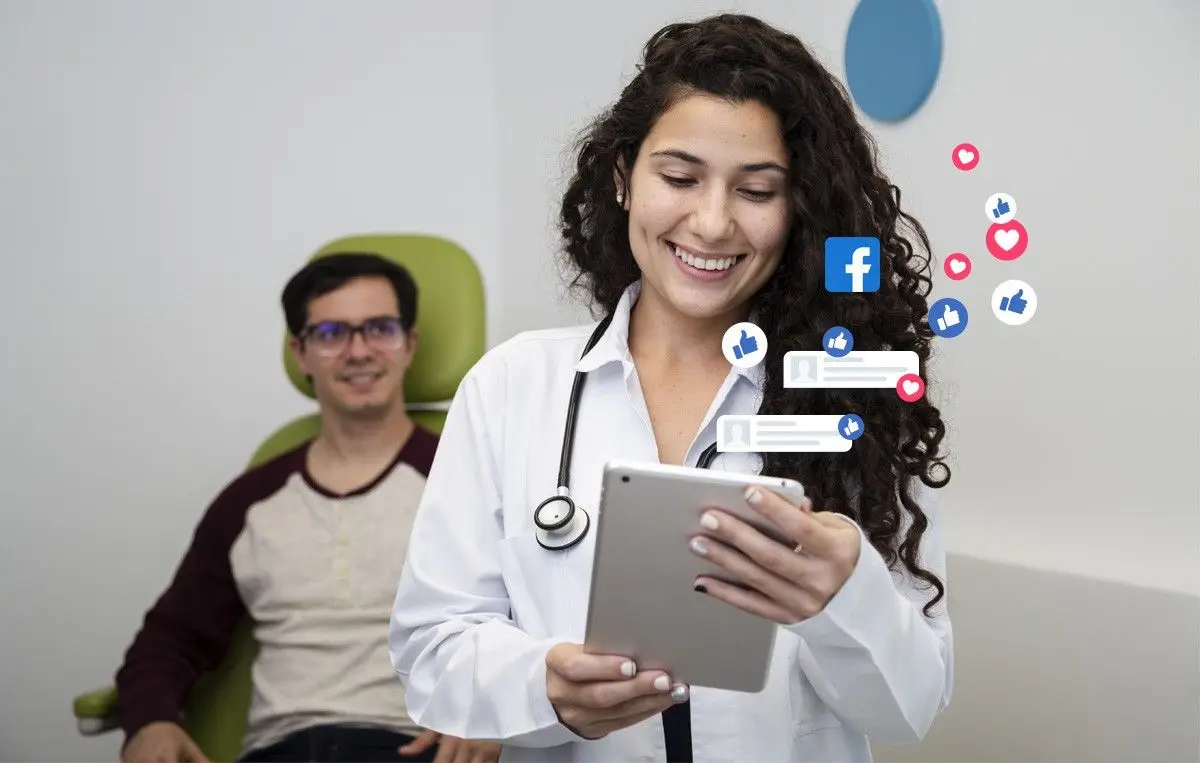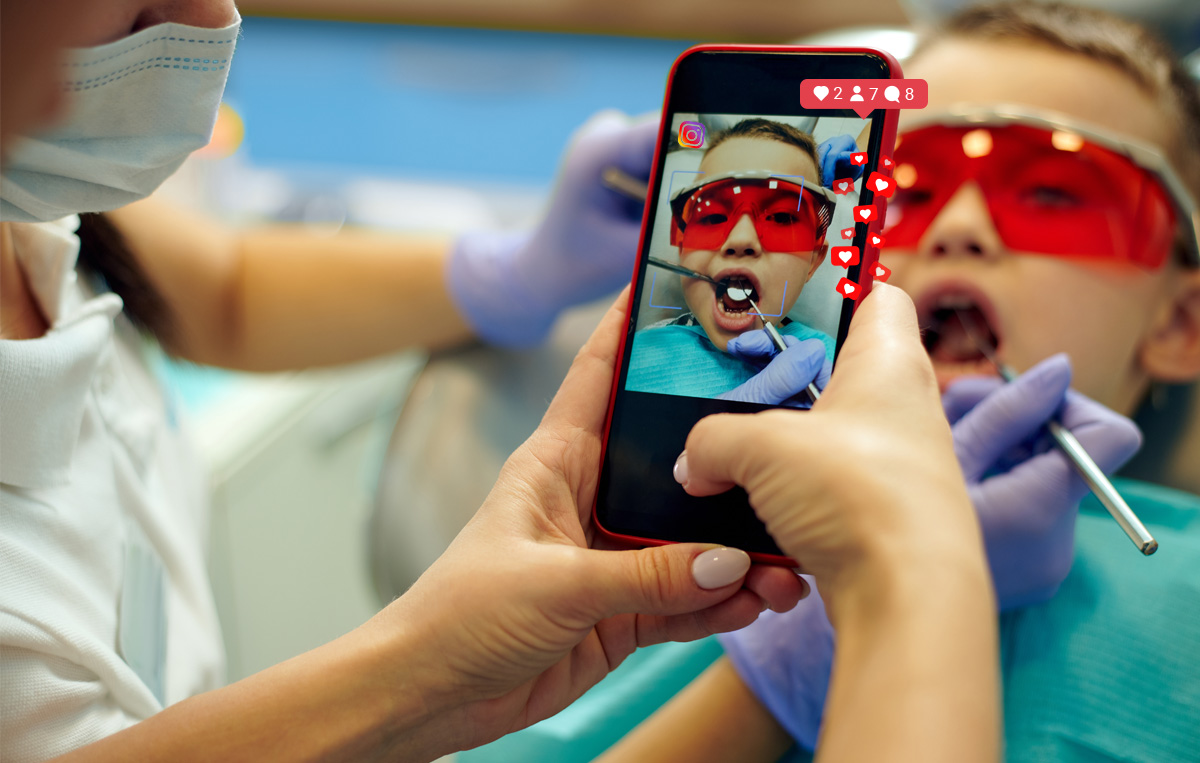Professionals from various industries have tapped into the potential of social media, and doctors are no exception!
Today, doctors are leveraging social media not only for personal interactions but also for professional purposes.
According to a survey by the National Center for Biotechnology Information (NCBI), out of over 4,000 physicians, more than 90% use social media for personal reasons, while 65% also utilize it for professional reasons.
So, why exactly are doctors turning to social media for professional use?
The answer lies in their desire to connect with their existing patients, engage with new audiences, and establish a robust network of followers.
From the general public’s perspective, this is also a beneficial situation. Individuals are always looking for credible medical content on the web – and who else to trust but the doctors on social media for accurate and reliable health information, right?
If you are looking for effective social media marketing strategies for doctors, keep reading this comprehensive guide to know the best practices, ideas, and strategies that simplify navigating social media for doctors.
Let’s begin.
Social Media Marketing for Doctors: The Top Networks
Before we move on to our main subject, it’s important to know the top social media networks for doctors.
Take a look:
1. Sermo
Sermo stands out as a significant social platform particularly designed for physicians. Think of this network as a secure yet anonymous environment where doctors can discuss medical issues, seek advice from a global network of verified physicians, and exchange insights.
Sermo is a space where doctors can connect with peers and stay up-to-date with the latest trends and research in the healthcare industry.
2. DailyRounds
DailyRounds is another social media network that doctors should have on their radar. This social network for doctors also doubles as a platform where doctors and healthcare professionals discuss medical cases.
Doctors can freely share medical images, deliberate on clinical cases, and present specific research findings on this platform. Additionally, DailyRounds grants you access to a vast library of medical resources.
3. Doximity
Doximity enables doctors to connect, collaborate, and share information. The platform offers features such as secure messaging, a comprehensive physician directory, and updates on medical news updates. Plus, there are also services like job search and credential management.
4. LinkedIn
LinkedIn, a well-known professional networking platform, boasts a staggering 875 million users worldwide. Among all mainstream social networks, LinkedIn holds the most relevance for doctors. LinkedIn Groups, in particular, are the spaces where doctors need to be the most active on this network.
There are numerous healthcare-related groups on LinkedIn where doctors can share insights, discuss industry trends, seek career advice, and network with other healthcare professionals.
- Some of the groups doctors can join on LinkedIn include:
- Medical Group Management Association (MGMA)
- Physicians Practice
- American College of Emergency Physicians (ACEP)
- Hospitalists’ Network
Apart from this, LinkedIn has specific features for business marketing that doctors can utilize. This includes creating a Company Page, optimizing it, and building a following.
5. Facebook
With its vast user base, Facebook is one of the best social channels for professionals to find and interact with current and potential customers. Hence, it’s an ideal platform for social media marketing for doctors.
Doctors are increasingly using Facebook to communicate with their patients while keeping proper conduct in mind.
Follow these steps when you decide to use this platform for social media marketing:
- Create a profile or page on the platform for your medical practice
- Add your basic information and the name and location of your hospital/clinic
6. Twitter
Twitter’s power lies in its ability to create a significant impact with concise tweets, making it an ideal platform for social media marketing for doctors.
As per the latest statistics, Twitter boasts 76.9 million from the US alone. Hence, you must leverage Twitter to create a network of followers, connect with new patients, and engage with your audience.
Tip: Using Twitter, you can:
- Share the results of your research. For instance, if you’ve conducted a study on the effects of a new drug, you can share the key findings in a series of tweets.
- Solicit patient feedback. You can ask your followers about their experiences with telehealth or their preferences for appointment scheduling.
- Review top medical journals. Share articles that you find interesting and add your own commentary to initiate discussions.
- Participate in important health campaigns. For example, during Heart Health Month, you can share tips for heart health and facts about heart disease.
- Virtually attend medical conferences. If you’re attending a conference (virtually or in-person), you can share the key points from the sessions in real-time, allowing your followers to learn along with you.
7. Among Doctors
Among Doctors is a global medical network that connects doctors and healthcare professionals from various specialties.
It provides a platform for knowledge sharing, clinical discussions, and professional networking.
The network also provides access to medical journals, case studies, and educational resources. It also hosts webinars, conferences, and collaborative projects to promote continuous learning.
8. Instagram
Instagram, known for its visual appeal, might seem like an unlikely candidate for this list. However, many doctors are unaware that Instagram can be a powerful tool for them to visually share their work, post patient testimonials, offer health tips, and do much more.
For instance, Dr. Hazel Wallace, also known as The Food Medic, uses Instagram to break down the science of healthy eating. She’s a big advocate for gut microbiome diversity, the lack of which has been linked to chronic illnesses like type 2 diabetes. Her posts often include easy-to-understand infographics, healthy recipes, and fitness tips.
If you choose Instagram as one of the platforms to establish your social presence, ensure you convert your regular Instagram profile to an Instagram for Doctors Business Account. This gives you access to a set of excellent tools to grow your account. You’ll be able to see rolling 7-day insights on impressions, profile views, website/call/direction clicks, post reach, and more.
9. YouTube
YouTube is another platform to consider for successfully implementing your social media strategies for doctors. If you believe you can consistently produce and share video content, then YouTube is definitely worth considering.
A great example here is Dr. John Campbell, a retired nurse teacher and A and E nurse based in England, who runs a YouTube channel. He explains complex health topics in simple terms and shares his insights on various health issues. His clear and concise explanations have made his channel a go-to resource for many seeking reliable health information.
YouTube is a great platform for doctors to reach a vast audience with educational content. You can create informative videos that educate your viewers about various health topics, medical conditions, treatments, and preventive measures. You can also offer practical health tips, lifestyle recommendations, and advice on maintaining overall well-being.
Now that we’ve shed light on the top social media networks for doctors, it’s time we discuss the content ideas they can use on social media.
6 Content Ideas for Doctors on Social Media
Here’s is a list of top content ideas that you, as a doctor, can implement for creating an active presence on social media:
1. Share Behind-The-Scenes Content
One type of content that will definitely engage your social media audience is behind-the-scenes content. It humanizes your social media and creates a personal connection with your audience.
For instance, you can showcase your workspace, introduce your team, share interesting medical cases (while ensuring patient privacy), or provide valuable insights into medical procedures.
An interesting example is Dr. Sandra Lee, famously known as Dr. Pimple Popper, who shares behind-the-scenes content on her YouTube channel, where she posts videos of her procedures, providing a glimpse into her daily work life.
2. Debunk Health Myths
Doctors can use their social media platforms to debunk common health myths or address certain misconceptions. You can share evidence-based information, cite reliable sources, and provide accurate explanations that help debunk these myths.
Dr. Leslie Gonzalez, a physician, uses her Instagram platform to debunk common health myths and misconceptions. She shares evidence-based information and provides accurate explanations to help debunk them.
3. Share Stories of Your Patients’ Journey
When you share stories of your patients’ medical journeys, it can prove to be impactful and educational for your social media audience.
With the necessary consent and privacy considerations, doctors can highlight successful treatment outcomes, discuss challenging cases, and provide insights into the diagnosis process.
Sharing such stories not only showcases the doctor’s expertise but also helps their social media audience understand different medical conditions and the importance of seeking appropriate care.
4. Come Up With Health Challenges
Another great content idea to engage your audience is to post about different health challenges. This encourages followers to participate in activities that promote physical or mental well-being, such as fitness challenges and mindfulness exercises.
But how is this whole approach going to benefit you?
When you actively involve your followers, you create a sense of community and foster a shared commitment to better health.
5. Host Ask Me Anything (AMA) Sessions
Hosting AMA sessions allows doctors to engage directly with their followers and address their health-related queries. You can conduct these sessions as live Q&A sessions or you can also collect questions in advance and provide detailed responses in your live sessions.
What makes AMAs a great content idea for social media engagement?
AMAs help build trust, establish your expertise, and address common concerns or misconceptions that your followers may have.
U.K. NHS surgeon Dr. Karan Rajan regularly hosts AMA sessions on his Instagram page addressing his follower’s various health-related queries.
6. Post Healthy Recipes
Doctors can also share healthy recipes and nutrition tips on their social media profiles. Promoting balanced diets, suggesting nutritious meal ideas, or offering cooking tips can inspire your followers to make healthier food choices.
Doctors can also address dietary concerns related to specific health conditions and provide guidance on managing them through appropriate nutrition. Dr. Mark Hyman shares posts related to healthy recipes on his Facebook.
Next up, we discuss important social media strategies for doctors.
Social Media Marketing Strategies for Doctors
Social media marketing is a powerful tool that doctors can leverage to enhance their online presence, connect with their patients, and share valuable health information. It involves various strategies to engage audiences, build trust, and establish credibility.
Let’s briefly discuss four strategies that will not only help you navigate the digital landscape but also maximize your impact on social media.
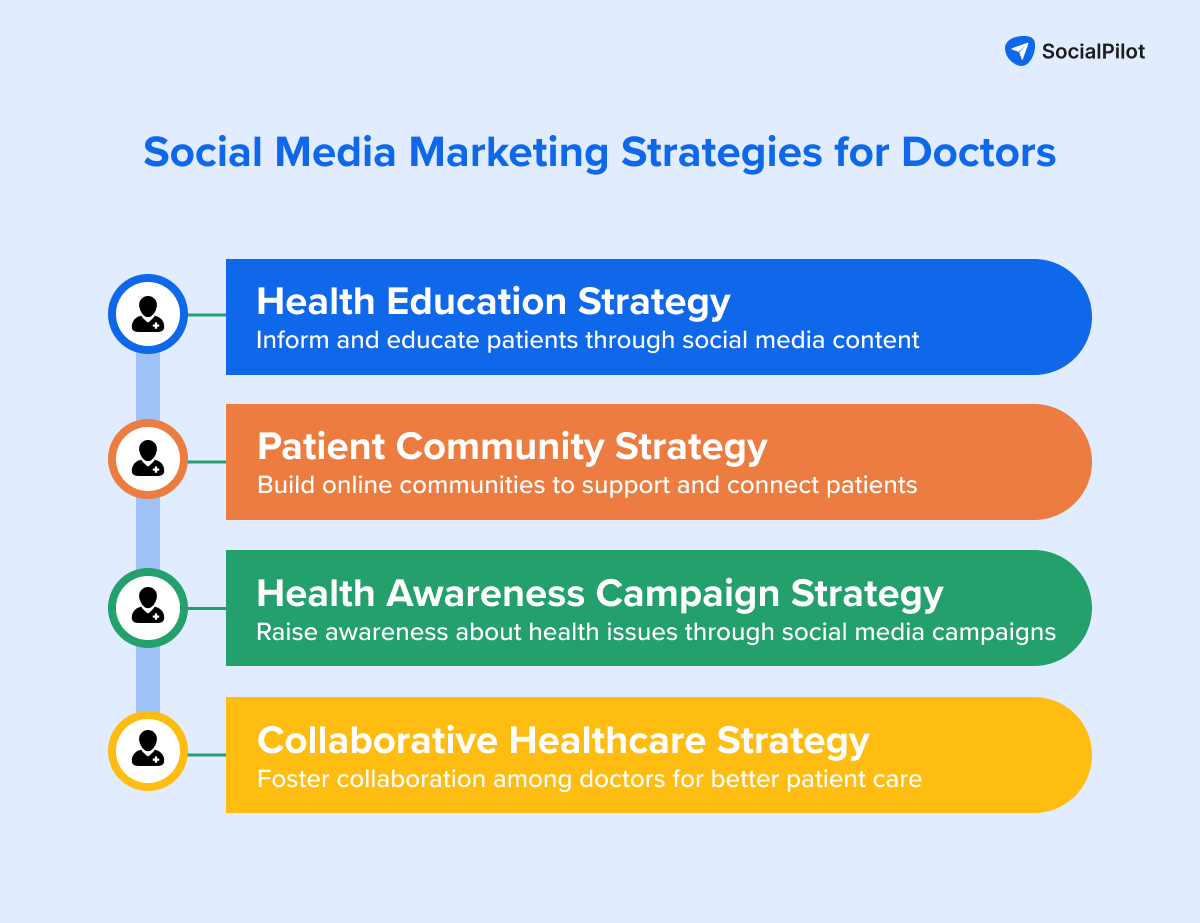
1. Health Education Strategy
This strategy focuses on disseminating medically accurate information in a digestible format. By sharing posts that explain common conditions, treatments, and preventative measures, doctors can become a reliable source of health information. This not only educates the public but also helps to debunk health myths and misinformation.
The use of infographics, short videos, and simple language can make complex medical topics more accessible to a broader audience.
2. Patient Community Strategy
Creating an online community allows patients to share experiences, ask questions, and support each other. This strategy fosters a sense of belonging and trust between the patients and the healthcare provider. It also provides a platform for patients to voice their concerns and receive guidance.
Regular engagement in these communities, such as responding to comments or hosting Q&A sessions, can humanize the healthcare experience and strengthen the patient-doctor relationship.
3. Health Awareness Campaign Strategy
Leveraging global health observances like World Diabetes Day can help to raise awareness about specific health issues. By sharing relevant resources, inviting expert guests for live sessions, or hosting virtual events, doctors can engage their audience in meaningful conversations about health.
These campaigns can also encourage preventive behaviors, promote early detection, and drive action towards health improvement.
4. Collaborative Healthcare Strategy
Collaboration with other healthcare professionals can provide a holistic approach to health. For instance, a cardiologist could partner with a dietitian to share heart-healthy recipes. This strategy enriches the content and demonstrates a comprehensive approach to patient care.
Collaborations can extend beyond social media, leading to joint webinars, shared patient resources, and cross-promotion of services, ultimately benefiting the patient community.
3 Doctors Doing Successful Social Media Marketing
Time to take cues from some doctors who have established a rock-solid presence on different social media platforms. Here’s a closer look:
1. Doctor Mike
Dr. Mikhail Varshavski, famously known as Doctor Mike, has a total of 4.4 million followers on Instagram.
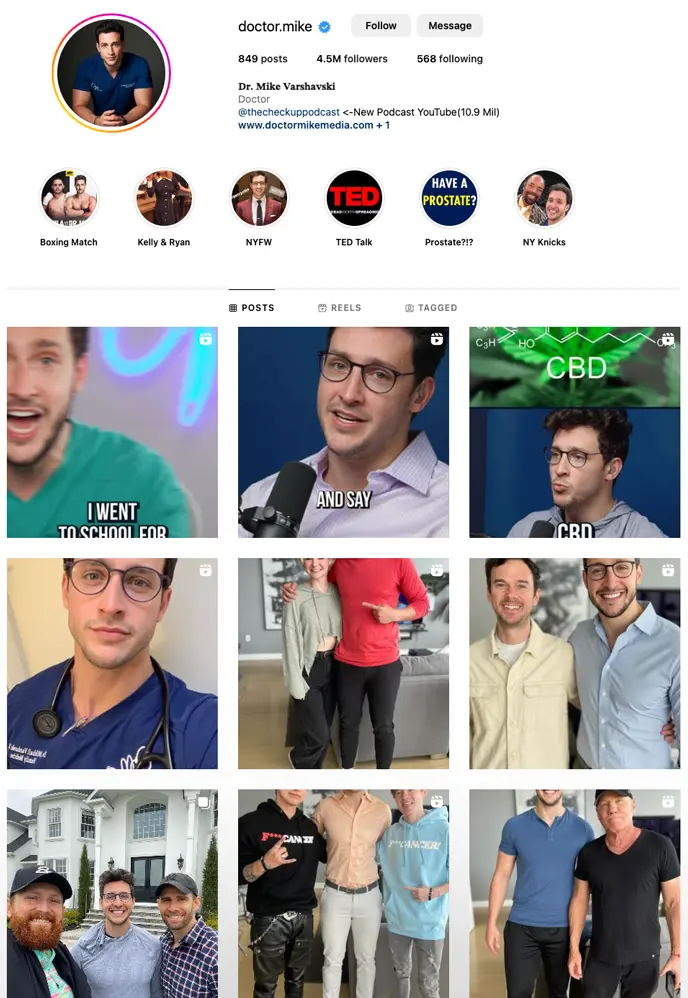
A snapshot of Doctor Mike’s Instagram profile | Source
Today, he is no less than a celebrity, with features in Men’s Health, People Magazine, Time, and Business Insider.
Doctor Mike typically posts videos and photos that encompass his daily life, whether at his job or the gym! Instagram users highly benefit from his posts that promote an active and healthy lifestyle.
Because Doctor Mike follows a strategy that relies heavily on visuals, Instagram is the perfect platform for him to engage with his existing and potential clients.
2. Howard Luks
Dr. Howard Luks is a sports medicine specialist and orthopedic surgeon based in New York with an active presence on every social media network!
Dr. Luks doesn’t have celebrity status and is a shining example of how your typical doctor can also create and maintain an impressive social media presence.
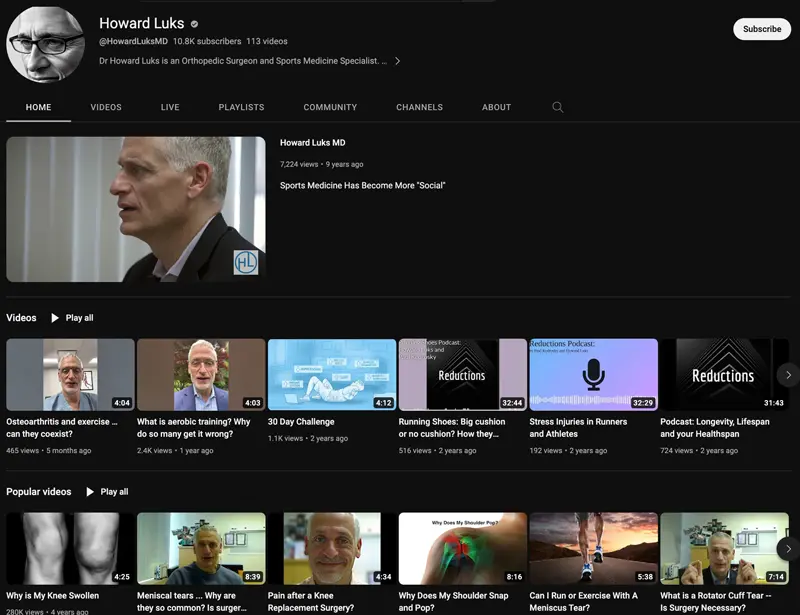
A snapshot of Dr. Luks’ YouTube Channel, where he regularly uploads videos discussing patient questions and orthopedic injuries | Source
In his YouTube channel’s trailer, Luk says, “85 percent of patients are researching their diseases and their physicians online.”
When you view Doctor Luks’ YouTube channel, you will see that his videos offer straight talk about orthopedic and sports injuries. These videos are easy-to-understand and answer some burning questions that people have in his area of expertise.
3. Dr. Alex George
Dr. Alex George, a prominent figure in the UK, has effectively utilized social media to advocate for mental health and well-being. With a little under two million followers on his Instagram account, he has managed to create a significant impact.
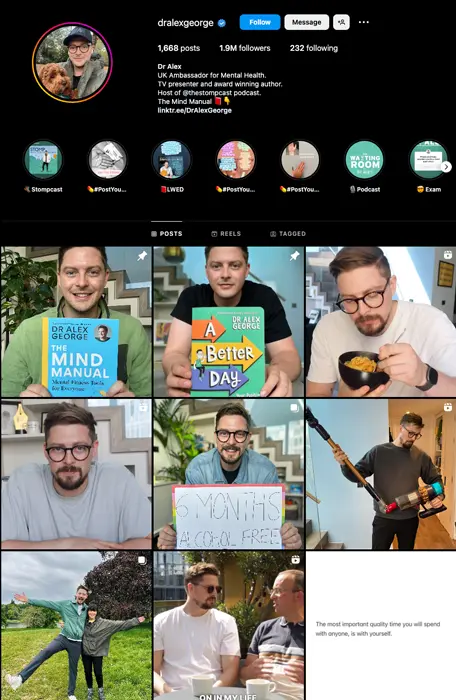
A snapshot of Dr. Alex George Instagram profile | Source
Dr. George’s journey to fame began as an A&E doctor, then as a contestant on Love Island, and now he is known as the UK Youth Mental Health Ambassador. His Instagram posts are a mix of personal life, professional insights, and mental health advocacy. He frequently shares posts related to mental health, self-care, and positivity, aiming to raise awareness and reduce stigma associated with mental health issues.
In addition to Instagram, Dr. George has also made his mark on YouTube, where he shares videos around mental health and self-care. His approach to social media is a testament to how doctors can use these platforms to advocate for important health issues and connect with a broader audience.
Next, we will discuss the five things doctors get wrong about social media.
Here it goes.
Social Media for Doctors: 3 Things Doctors Get Wrong
As a doctor looking to establish a solid presence on social media, it’s crucial to understand and debunk the myths surrounding a doctor’s social media usage for professional purposes.
Here’s a closer look at the common misconceptions doctors have about social media:
- Social media just isn’t important for doctors: This is a myth that needs debunking. Social media is a powerful tool for doctors, offering a variety of benefits. It can enhance your reputation, keep you updated with the latest developments in your field, and even make a difference in patient’s lives by providing basic information such as office hours and locations. Furthermore, doctors can direct patients to a specific portal or phone line for urgent inquiries.
- Social media won’t help your healthcare SEO rankings: Contrary to this belief, an active social media presence can indeed boost your SEO rankings. It signals search engines that you have a credible practice, which can lead to your social media profile appearing in the search results.
- Social media for doctors is a passing trend: This is another misconception. Platforms such as Linkedin, Twitter, YouTube, and Instagram have long helped businesses and practices to increase reach and exposure and will continue to do so. Therefore, to get discovered by potential clients in your area, you must get on social media if you haven’t already.
SocialPilot: The Perfect Social Media Marketing Tool for Doctors
Doctors lead extremely busy lives. Managing various social media platforms to maintain consistent posting can be time-consuming, from creating engaging content to tracking post schedules. But what if there was a tool that could simplify social media management for doctors? Enter SocialPilot!
SocialPilot is an excellent social media management tool equipped with a range of features to help you manage your social media accounts seamlessly. These features include:
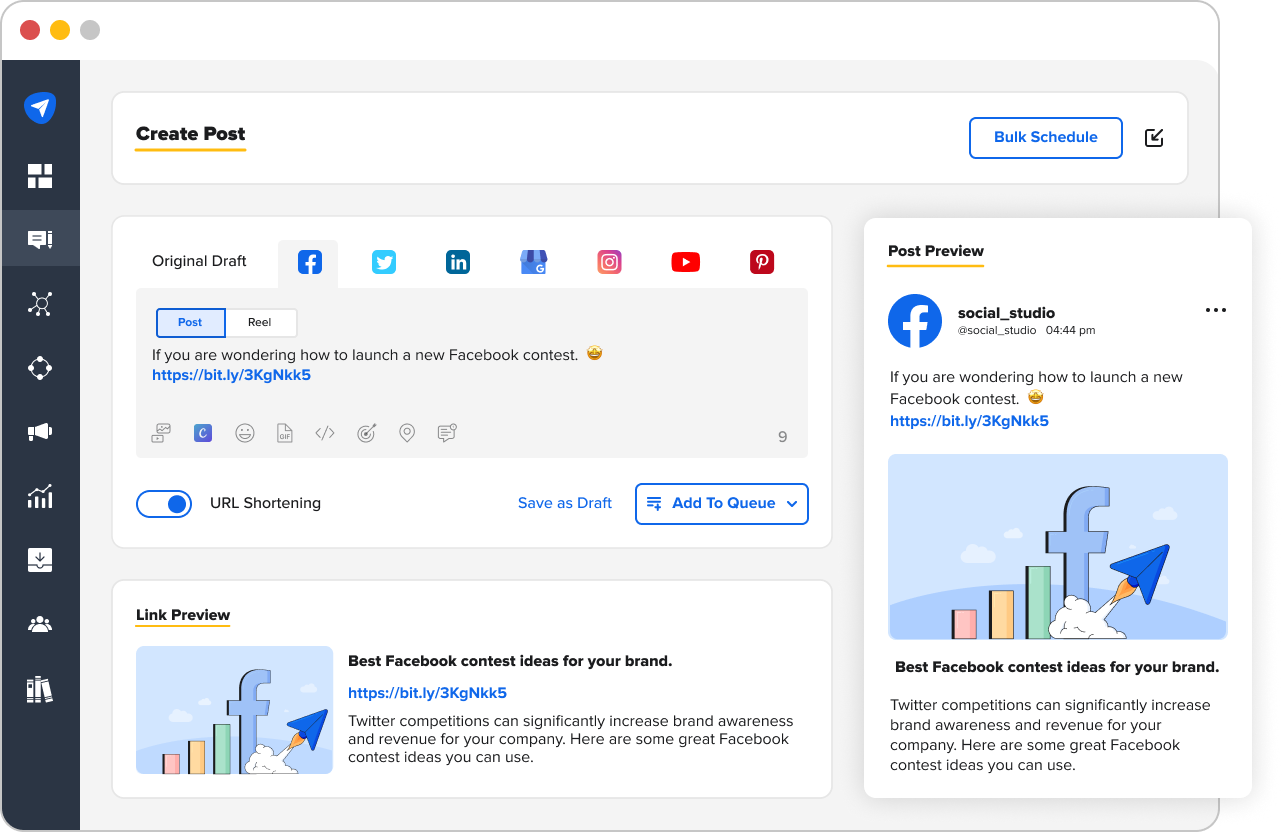
- Multi-platform support: You can effectively manage all your social media accounts on one dashboard.
- Social media scheduling: You can schedule posts in advance for different social networks simultaneously. This saves loads of your time and helps you maintain a consistent, active presence. You also get customization options to tweak your content as per the demands of each platform.
- Universal Inbox: This feature helps you effectively manage your social media communication. You can seamlessly organize all your social media interactions at a single place and respond to your audience well within time.
- Analytics: This feature enables you to analyze the performance of social media platforms quickly and make newer strategies.
Conclusion
All said and done, it’s clear that doctors can leverage social media to provide accurate medical information, share engaging content, and increase their exposure. This attracts more clients and boosts business and allows doctors to make a difference in people’s lives.
Social media is ideal for doctors to create and disseminate valuable, share-worthy content relevant to their practice, patients, and specialty.
